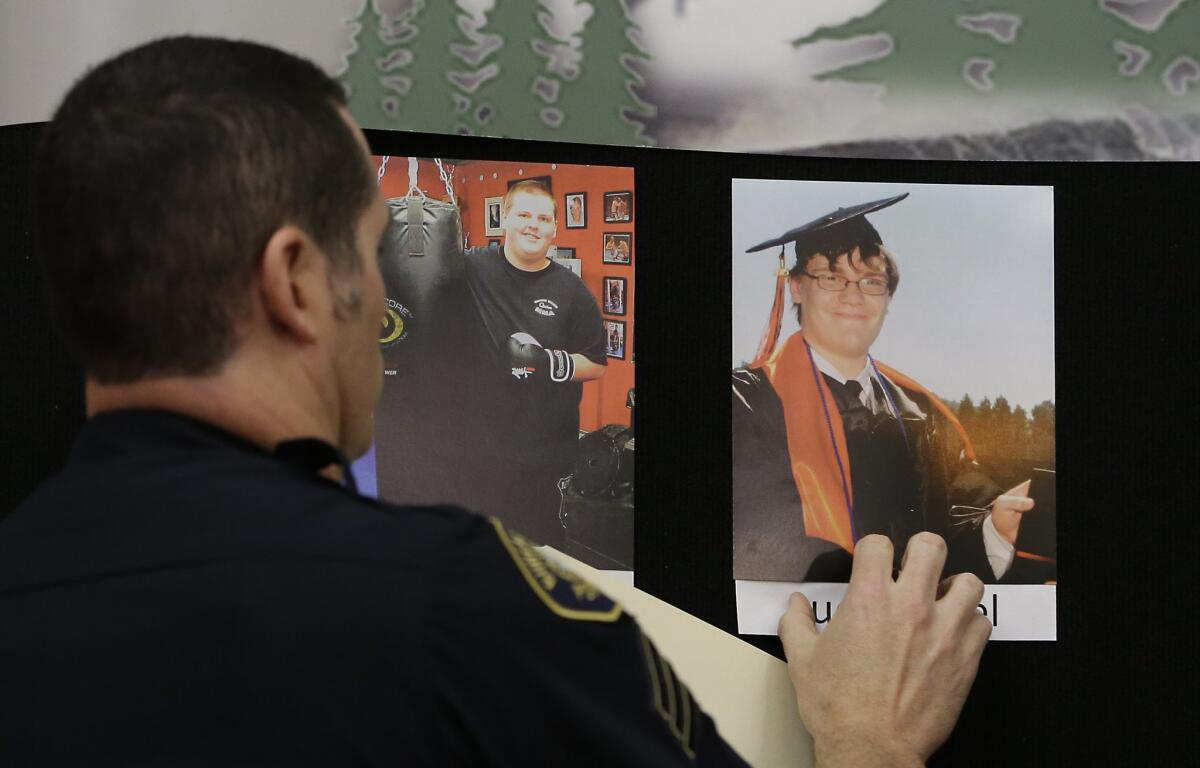In Theory: How should the media handle coverage of mass murders?

Portland Police Sgt. Pete Simpson places a photo of shooting victim Lucas Eibel, 18, next to a photo of victim Quinn Cooper, 18, during a news conference, Friday, Oct. 2, 2015, in Roseburg, Ore. Cooper, and Eibel, were among those killed when a gunman, Chris Harper-Mercer, walked into a classroom at the Umpqua Community College the day before and opened fire.
On Thursday, Oct. 1, a 26-year-old man walked into an Oregon community college classroom armed with guns, killed nine people and wounded 10 others. Soon afterward he exchanged fire with local police and was killed as well.
As always happens, the killer’s identity was soon known and his name and picture soon saturated the media coverage of the mass shooting.
The man identified as the shooter allegedly wrote about the recent high-profile double murder of a Virginia TV news reporter and photographer, shot and killed on air in late August.
“I have noticed that so many people like him are all alone and unknown, yet when they spill a little blood, the whole world knows who they are,” the man wrote, in reference to the gunman in that shooting. “A man who was known by no one, is now known by everyone. His face splashed across every screen, his name across the lips of every person on the planet, all in the course of one day. Seems the more people you kill, the more you’re in the limelight.”
Douglas County Sheriff John Hanlin, whose department responded to the shooting at Umpqua Community College, has refused to utter the killer’s name, saying he wouldn’t give him the fame he seemed to be seeking.
This massacre has again brought up the debate around how media outlets cover mass murder, particularly those identified as the murderers. Some say the level of coverage — which sometimes includes quoting the killer or reading from their manifesto — could be inspiring copycats.
Q: Should the media be more mindful of the coverage they give to the persons who carry out mass murder? Or do they have an ethical imperative to report as much as they can to provide the fullest picture of how these tragedies happened?
--
Yes and yes. I look to responsible media for coverage which does not glorify these violent attackers while providing the full picture of mass shootings.
I feel sympathy for the mourners and understand how hearing the killer’s name would cause them fresh pain, but denying reality won’t bring their loved ones back. Some of the people in Roseburg, Ore., who like their sheriff refused to name the killer, also spoke vigorously against gun control, claiming that people with guns in the classroom could have prevented the slaughter.
This kind of specious, dangerous thinking demands a reasonable, intelligent rebuttal. Quality sources of good journalism provided numerous examples of accurate, factual reporting, background and in-depth analysis.
“Firearm Fantasies” is how a recent op-ed headline pointed out that guns are unlikely to keep their owners safe: a gun is 22 times more likely to be used in an accidental shooting, a homicide or a suicide than it is to contribute to a successful self-defense by the gun’s owner against an attack.
“Mass Killings Seen As A Kind Of Contagion” headed research revealing that “many, if not most” mass-shooters intensely followed coverage of earlier mass attacks. (Followed online, I would add — promoting a return to print news seems to me no more illogical than calling for more guns to keep us safer.)
Since the Roseburg murders, there have already been two more college shootings. The higher a U.S. state’s gun ownership rate, the more gun suicides and homicides. Countries with tighter gun controls than ours (i.e., all of them) have fewer mass killings than we do. Colonists’ single-shot, front-loading muskets used in a “well-regulated militia” have morphed into a vast, high profitable, loosely-regulated industry whose main product is human misery.
Censoring killers’ names won’t help us any more than the magical thinking that we can kill our way out of this horrible morass.
Roberta Medford
Atheist
Montrose
--
Right now I’m a minister, and I can understand the sentiment of not mentioning the killer’s name. But before I was a minister, I was in the news business, and even reported and anchored the news for KVAL-TV in Eugene, Ore., not too far north of Roseburg, where the most recent massacre occurred.
So the news person inside this minister’s skin wants there to be fair and open reporting always. While I understand the feelings of the law enforcement officer who did not want to mention the killer’s name, I am also a firm believer in the 1st Amendment, which guarantees freedom of the press.
In truth, what we need is not the withholding of bad and crazy guys’ names; we really need sane and sober gun laws that keep weapons from the hands of the deranged.
Don’t I believe in the 2nd Amendment, which allows for gun ownership? I suppose.....but I am not a Fundamentalist, whether it comes to Scripture or the U.S. Constitution or the Bill of Rights. God gave us these wonderful minds to think with, and Jesus even said to love the Lord your God with all your heart and mind and soul and strength (Matt 22:37).
We need to use our God-given minds to come up with better gun laws, not simply omit the names of our killers.
The Rev. Skip Lindeman
La Cañada Flintridge Congregational Church
La Cañada Flintridge